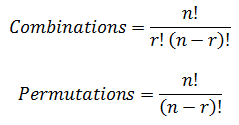|
|
COMBINATIONS & PERMUTATIONS |
|
|
|
|
|
|
|
In several fields of mathematics, the terms combinations and permutations are
used to specify the number of states generated for a given situation. Their
difference relies on the ordering of the given objects when iterating through
potential states. In particular, the number of permutations of a given state
represents the number of all of the possible ways that a specified set of
objects can be represented, whereas combinations do not repeat the same state in
different order.
|
|
|
|
|
|
|
|
Texas Hold’em Poker Example [1]:
|
|
|
|
When calculating probabilities in the Texas Hold`em Poker, we only take into
consideration the number of combinations rather than the number of permutations
since the order in which the community cards are presented does not matter. The
state {10♠, J♥, Q♣, K♦,
A♠} is equivalent to {Q♣, 10♠, J♥, A♠, K♦}. The same applies when playing poker with more
than one opponent since we do not care by whom we may lose, but only if we may
lose.
|
|
|
|
Why is it important?
|
|
|
|
When calculating probabilities we save an enormous amount of time when
processing and evaluating the different number of states since the number of
combinations is equal to the number of permutations divided by the factorial of
the number of objects. Assuming a total number of
n objects available and
r objects chosen, the equations for
calculating combinations and permutations are respectively:
|
|
|
|

|
|
|
|
|
|
|
|
Further, there might be cases in which repetition of the objects is permitted.
For example, if in a card game the state
{K♦, J♥, Q♣, K♦, A♠} is possible, then repetition is permitted
when generating the potential states; implying that an even larger number of
states is to be generated for both combinations and permutations. Assuming a
total number of n objects available
and r objects chosen, the equations
for calculating combinations and permutations with permitted repetition are
respectively:
|
|
|
|

|
|
|
|
|
|
|
|
The calculator below will give you an idea of how massive the difference in
states generated can be depending on the importance of the order and repetition.
|
|
|
|
|
|
|
|
|
|
|
|
|
|
|
|
|
|
Without Repetition |
With Repetition |
|
Combinations |
Label
|
Label
|
|
Permutations |
Label
|
Label
|
|
|
|
|
Table 1. States generated per condition |
|
|
|
_______________________________________ |
|
|
|
REFERENCES |
|
|
|
|
|
|
[1] |
Constantinou, A. C. (2009). Mathematical study of rational behaviour in Poker. M.Sc Thesis,
Department of Engineering and Information Sciences, University of Hertfordshire,
UK. |
|
|
|
_________________________________________________________________________________________ |
|
|
|
published online, 19/02/2012 |
|
|
|
|
|